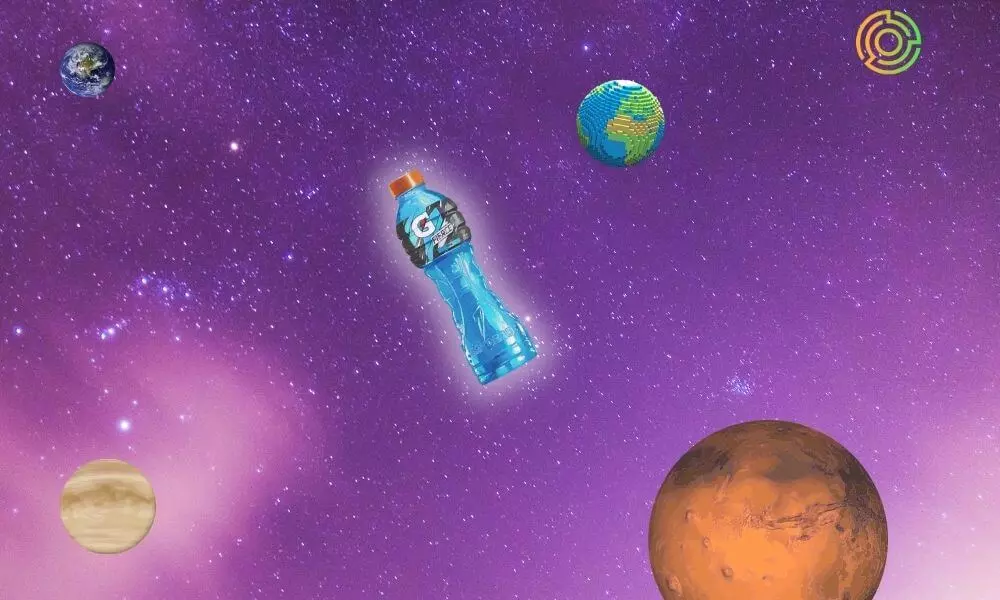A long day of living in the Sandbox metaverse can be downright exhausting. While taking the crew on a tour of your new digital palace can be fun, it can leave one pretty parched as you wildly flail your arms around the bedroom.
As the world moves deeper into the black hole of the metaverse, Gatorade seems to be the digital fuel with its “virtual drink products” following its recent trademark filings.
What does Gatorade intend to do?
According to forms filed with the U.S. Patent and Trademark Office. On April 27, Stokely-Van Camp filed two applications for the word Gatorade and the sports drink’s “G” logo for use in connection with virtual beverage products and NFTs.
Stokely-Van Camp’s filing of the trademark applications could trigger a virtual beverage war with Coca-Cola. While the beverage company has not disclosed its plans for Powerade in the metaverse, it has launched a “pixel-flavored” drink and an accompanying game in Fortnite. The metaverse, then, may become another battleground between PepsiCo and Coca-Cola, this time through sports drinks.
Josh Gerben, a trademark and patent attorney, first reported the news on Twitter.
Getting dehydrated from a workout in the metaverse?
Gatorade will have you covered.
Per a trademark filing made on April 27th, @Gatorade plans to soon offer "virtual beverage products."#metaverse #gatorade#web3 #FuelTomorrow pic.twitter.com/4HZbTEoSWM
— Josh Gerben (@JoshGerben) May 3, 2022
Although, at this time, this new filing only hints at Van Camp’s next moves with the Gatorade brand. However, as other global brands make their metaverse moves, Gatorade’s Web3 debut is only a matter of time.
At the moment, there are no exact details on when the agency will review Van Camp’s applications. As major brands dive into the metaverse, Web3 enthusiasts are skeptical. Billed as the “new-age gold rush,” the Web3 boom forged the names of many creators we know today.
Trademark filings are the first step of Web3 for many companies
While the metaverse remains a hot topic, many companies are choosing to dive into it rather than dive in headfirst. The primary way companies test the waters is through branding applications. They signal consumer intentions, but they don’t require a lot of resources.
A handful of companies that have filed applications in recent months include Hooters, Victoria’s Secret, L’Oréal, American Express, the New York Stock Exchange, the NBA, Walmart and McDonald’s.
Although the companies mentioned belong to a wide range of industries, the language of the trademark applications is remarkably similar. Most mention a mix of virtual or digital goods, different file types such as audio or video, and non-fungible tokens.
Gatorade’s trademark application is a good example. They want to trademark the product for use in the metaverse rather than create a new product immediately.
Gatorade’s foray into Web3 also represents odd timing: It is making its intentions clear on Web3 before PepsiCo does.
Time will tell how it navigates Web3 and what its virtual beverage product may entail. But given the popularity of Decentraland Fashion Week and the NFT scene, there is demand for digital products.
However, as franchise brands make their way into the metaverse, fear fills the air as our Web3 world becomes the very thing we’re trying to avoid.
Will the virtual beverage last?
Gatorade, now owned by Pepsi Co, has had an exceptional year, with sales of $2.6 billion in U.S. stores in 2021. Not to mention controlling more than 45% of the global sports drink industry.
So as Gatorade looks to bring its drink to virtual shelves, one can only wonder what this giant has up its sleeve. However, the brand review process may take about six months, so don’t expect your virtual satiating anytime soon.
